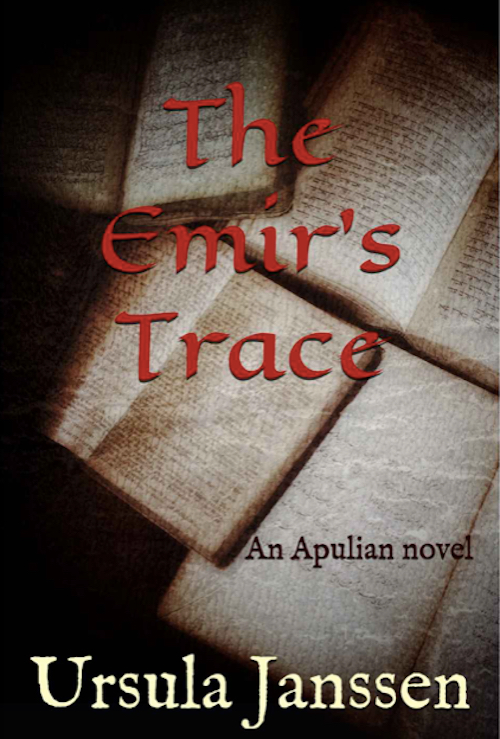Interview with Ursula Janssen
Author of The Emir's Trace
Ursula Janssen, born 1978, is an archeologist and freelance author and now lives with her husband and daughter in southern Italy, after spending several years living and working in various countries in Africa and the Middle East. She writes mostly historic novels but has also published a novel for young readers.
Buy this book
How would you describe "The Emir's Trace" to a new reader?
- "The Emir's Trace" is a novel about a quest, not only for a hidden history, but also for a good and authentic life. At the same time it describes Southern Italian lifestyle and traditions.
The novel is set in two time levels: firstly the contemporary one, describing the protagonists' quest to solve an old riddle transmitted from generation to generation, and secondly the diary of Sawdan, the last Emir of Bari in the 9th century CE.
What was the inspiration behind "The Emir's Trace" ?
- I wrote an article for the Italian issue of the National Geographic Magazine about the history of interfaith cohabitation in Southern Italy. During my research I realized that the material I gathered, combined with my own life experience in Puglia, is rich enough to make it into a novel.
Which authors do you admire? How have they influenced your writing style?
- My favorite author is Umberto Eco. I am sure that his novels and his style have inspired me a great deal.
Can you tell us a little about the locations in the book?
- "The Emir's Trace" is set in Puglia in Southern Italy, an enchanting region with a rich and at the same time checkered history, with captivating customs and fascinating traditions.
What's your writing process?
- As an archaeologist I put great emphasis on correct and precise research, so a lot of time goes into it even before I sketch the story outline. Despite being a fiction book, the history, sites and traditions described are absolutely factual.
Which character in "The Emir's Trace" has had the greatest impact on readers?
- Apart from the main characters Lia and Alessandra it is mainly Lia's old aunt, Zia Jann, who will captivate the reader. Zia Jann is a "masciàre", a traditional healer and wise woman, kind-hearted but stubborn, who at the same time is the source of a seemingly unlimited collection of old stories and legends.
How have readers responded to "The Emir's Trace"?
- "The track of the Emir is a difficult to describe mixture of different genres, but basically 'simply' a story about life. Doesn't that sound exciting? But it is!"
"In her story, the author skilfully merges the here and now with the past - what impressed me most about it: it is not the level of the medieval narrator, but the present that, above all, seems strange. The simple life in Puglia as a blatant break with the completely ordinary life of the main character highlights the question of what makes us happy and what really has value for us."
"Those who love Italy, especially the south, will also like this novel."
To whom would you recommend "The Emir's Trace?"
- I would recommend this book to all lovers of Italy, of historical riddles and of historical fiction in general.
Have you published other books yet?
- Yes. As I write in German, not all of my books have been translated into English yet. What has been published in English is "Werecreatures", a fantastic teen novel (a completely different genre, I know) which I wrote for my daughter, and which addresses issues like tolerance, bullying and respect. Back to the historic genre, my third novel about a 17th century librarian's quest throughout Europe for a legendary heretic manuscript has not been translated into English yet, but hopefully soon...
Where next? What are you working on now?
- At the moment I am working on the biographical novel „The Photojournalist“ (working title), describing the adventurous and audacious life of Iranian-French photojournalist Manoocher Deghati, set against the backdrop of the last fifty years of world history. All of these close encounters with historic events constitute the background to personal stories, both dramatic and comic. They are stories of extraordinary experiences, remarkable encounters, incredible coincidences and numerous anecdotes, some of them more fantastic than any invented story could be. At the same time they illustrate the nature of oppression, the protagonist's struggle for freedom, and an unbreakable joy of living.
Synopsis
When young historian Lia Winter’s uncle dies, she travels to Southern Italy to spend several weeks with her aunt who is a masciàre, a traditional herbalist. Lia quickly finds herself increasingly fascinated by her aunt’s archaic way of life and her canny wisdom. As a historian, she cannot help but try to get to the bottom of the mysterious stories and legends her aunt tells. Together with her new friend Alessandra, an antiquarian bookseller, Lia soon finds herself following a trail of astonishing secrets - a quest which, in the end, leads to the rediscovery of lost ancient Arabic manuscripts.

